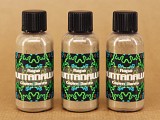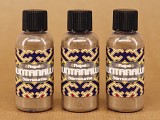Bottle, 10 Ml, 7 Gr from Brazil (SKU 3766)
(Batch #7101). This potent Rapé blend from the Kuntanawa tribe features Sabia Corda Tabaco, Sapota ashes, and a sacred vine known as Veia de Pajé—“Vein of the Medicine Man.” Also called Jiboinha or “Little Boa,” the vine is used in Kuntanawa forest rituals to attract luck, love, and prosperity, and to shield against jealousy and spiritual interference. Its energetic nature is said to amplify one’s intentions, drawing in the good and deflecting the unwanted. The combination with grounding Tabaco and gentle Sapota ash creates a balanced yet powerful tool for focused spiritual work. More detailed information can be read below in the description.
Packed in 10 ml clear plastic bottles containing 7 gr.
| change currency | |||||||||
| SKU | Part | Volume | Weight | Unit | Price | Qty
|
|||
|---|---|---|---|---|---|---|---|---|---|
| 3766 | bottle | 10 ml | 7 gr | 1 pc | $ 23.08 | ||||
| 3785 | bottle | 25 ml | 15 gr | 1 pc | $ 39.24 | ||||
| 4582 | pot | 60 ml | 40 gr | 1 pc | $ 114.05 | ||||
Kuntanawa Veia de Pajé, A protective and intention-driven Rapé made with the sacred vine known as the Shaman’s Vein
Introduction
Kuntanawa Veia de Pajé is a refined and powerfully intentional Rapé blend from the forests of Acre, Brazil, prepared by a trusted Kuntanawá Rapé maker. At its heart is a remarkable plant known within the tribe as Veia de Pajé—the Shaman’s Vein—a thin, heart-leafed vine also affectionately called Jiboinha, or Little Boa. In Kuntanawá cosmology, this vine plays a central role in traditional rituals and magical forest practices. It is used in spiritual baths to draw luck, open paths in relationships and business, attract prey during hunting, and ward off negative energies.
In Rapé form, the vine acts as a kind of energetic magnet—pulling in the good, repelling the harmful—and is said to work in harmony with one’s mind. Users are cautioned to apply it with clarity and focus, as the plant is believed to respond directly to the intentions carried into its use. This sacred preparation blends the protective and attracting forces of Veia de Pajé with Sabia Corda Tabaco and Sapota ashes, forming a grounded and alchemically active Rapé that mirrors the spirit of Kuntanawá forest knowledge.
Observation
A moderate dose reveals itself as immediately aromatic, with a warm, herbal-spicy scent that awakens the senses. Within seconds, a deep, delayed strength rises—a glowing, slightly stingy warmth that fills the nostrils and face for several minutes. Slow, steady breathing allows the intensity to unfold pleasantly, transforming the burn into a vibrant and grounding presence.
Soon after, light fluids begin to clear from the nose, marking its distinctly purifying nature. The blend feels fairly strong, leaning more toward Tabaco than most of the "greyer types", giving it a powerful and steady body. As the force descends from the head into the chest, a comfortable calm settles in, while a lingering spicy tingling remains after blowing the nose.
As the sensation grounds itself, a pronounced clarity persists in the forehead—a sign of its balanced yet potent Kuntanawa character. Kuntanawa Veia de Pajé stands as a robust and cleansing Rapé, best appreciated by experienced users who seek depth, focus, and warmth in their connection with the medicine.
A higher dose or a stronger blow amplifies the entire experience. The warmth turns more forceful, expanding deeper into the sinuses, where the sting becomes more persistent and commanding. It remains a powerful yet rewarding medicine, though the intensity at this level may challenge even seasoned users, requiring slow breathing and composure to ride the wave gracefully.
Ingredients and Composition
This Rapé features three foundational elements:
– Sabia Corda Tabaco (Nicotiana rustica): a powerful, blackened rope Tabaco known for its deep grounding and clarity
– Sapota ashes (Pouteria species): soft, nourishing, and energetically protective
– Veia de Pajé: a thin vine revered for its magical and energetic properties
The blend is designed for spiritual protection and manifestation work. It is said to shield against jealousy, envy, and spiritual interference while drawing in prosperity, love, and aligned outcomes—provided the user carries a clean and steady intention.
Sabia Corda Tabaco – The Deep and Grounding Force
Sabia Corda is a traditional Brazilian rope Tabaco, recognized by its nearly black, sticky appearance and potent nicotine content. Shade-dried and tightly twisted into small-diameter cords with a length of 10 meters, it undergoes a slow fermentation process that intensifies its strength and aroma.
Unlike some Tabaco's with sharp or smoky notes, Sabia is almost neutral in flavor—making it ideal for ceremonial Rapé, where other ingredients take center stage. In Kuntanawa Veia de Pajé, it anchors the experience, lending a firm foundation to the more subtle spiritual effects of the vine. To read a detailed article on the Sabia Tabaco, click here.
Sapota Ash – Gentle, Nourishing, and Spiritually Protective
The Sapota tree (Pouteria species) is considered a “mother tree” by the Kuntanawa—a source of both physical sustenance and spiritual steadiness. Its fruit is sweet and nutritious, while its bark and wood produce a soft, clean ash highly regarded in Rapé preparation. Sapota ashes are particularly suitable for regular use. They are gentle on the nasal passages, supportive of meditation, and known to help dissolve emotional turbulence and energetic stagnation. In this blend, Sapota tempers the potency of Sabia and helps channel the magnetic quality of the vine. To read a comprehensive article on the Sapota ashes, click here.
Veia de Pajé – Shaman’s Vein, Heart of the Boa
The vine known as Veia de Pajé, or Vein of the Medicine Man, is a revered spiritual ally in the Kuntanawa tradition. Its heart-shaped leaves and serpentine growth have earned it the nickname “Heart of the Boa Constrictor,” while the affectionate term “Jiboinha” (Little Boa) hints at its intimate, magical nature.
Used in forest magic, this vine is believed to bring fortune in love, improve business, aid hunters in becoming “invisible” to prey, and protect against the envy or ill will of others. It is also employed in spiritual baths to draw beneficial energies and clear negative currents. Its full power is traditionally harnessed through quiet teachings and trusted exchanges—never spoken lightly, always handled with care.
In Rapé, Veia de Pajé is said to amplify one’s intent. If used without clear purpose, it may invite chaotic results. But with steadiness of mind and right conduct, it opens a space of deep spiritual alchemy—drawing blessings and shielding the practitioner on subtle planes.
Despite its deep cultural significance, Veia de Pajé has no confirmed botanical classification. It remains a plant of oral tradition, transmitted through forest knowledge rather than Western science. Like many sacred plants, it resists easy cataloging, its identity rooted in practice rather than taxonomy.
The Kuntanawa People – Stewards of Forest Medicine
The Kuntanawa are an Indigenous group from the Tejo River region in Acre, Brazil, whose population and culture nearly disappeared during the rubber trade atrocities of the early 20th century. Through the guidance of Ayahuasca and intertribal alliance, the tribe began a spiritual and cultural revival in the early 2000s—reclaiming their language, songs, ceremonies, and plant medicine traditions.
Their Rapé blends are recognized for their chest-centered effects, often enhancing the heart space and inner clarity. Their use of plants like Samauma, Jarina, and Veia de Pajé reflects a profound sensitivity to subtle energy—Rapé not as a stimulant, but as a precise tool for alignment and protection. To read a detailed article on the Kuntanawa tribe, click here.
Energetic Effects and Use Guidance
Kuntanawa Veia de Pajé is a spiritually charged, protective Rapé. It’s meant for those doing focused energetic work—calling in blessings, clearing spiritual interference, and realigning with strength and clarity. The first impression may be grounding, followed by a magnetic centering sensation that draws attention inward. Many report a silent, shield-like presence around the heart and head—a space of clarity where unspoken thoughts become intention. It is not meant for casual or distracted use. This Rapé responds to the user’s mental and emotional stance. Sit up, breathe deep, and place your purpose clearly—this medicine will meet you there.
Customer Report
"...As an experienced Rapé user, I work with it both casually and ceremonially. This particular Rapé gives the word casual a new meaning. It demands presence. Upon use, I had to sit down and let the experience unfold. Stronger than average, intensely stingy, almost painful at first, it is certainly not one to introduce to a novice. A tingling sensation remains for several minutes after blowing the nose, gradually softening into a deep calm. This is a Rapé for the advanced user. One that invites a pause, a moment out of time. The description protective is no exaggeration; it leaves me feeling comfortable, grounded, and surrounded by an unmistakable energetic field of strength and clarity..."
Setting the Standard for Ultra Fine Rapé
We take great care to reprocess all received stock to ensure the finest quality powder. Often, Rapé arrives with varying levels of fineness due to the lack of professional sieves used by the tribe. To address this, we meticulously sieve all powders to remove rough bits and particles, resulting in an exceptionally smooth and effective powder at 150-micron fineness. We use laboratory-grade sieves and dehydrating equipment to achieve this quality. This is our standard because it provides the best Rapé experience.
Disclaimer
The information provided above is for historical, educational, and scientific purposes only. It should not be interpreted as a recommendation for the specific use of our products. Any statements about traditional uses are informational. The use and application of our products are the customer's decision and responsibility.
Copyright Notice
All content, including this article, is protected under copyright law. Any unauthorized reproduction, distribution, or use of this material is prohibited. Duplication of this content, in whole or in part, without written consent, is a violation of copyright regulations.
Other names: Shaman´s Vein, Heart of the Boa Constrictor, Jiboinha (Little Boa)
This item is not allowed in the following countries:
Finland
This natural product is offered for its ethnographic and historical value and is delivered with no expressed or implied fitness for a specific purpose. It is simply a raw botanical specimen, or a scientific sample. The information provided is purely meant for historical, scientific and educational purposes and should never be interpreted as a recommendation for a specific use. The use and application of our product is at the customer's decision, responsibility and risk.
Read our Terms & Conditions for more details.











